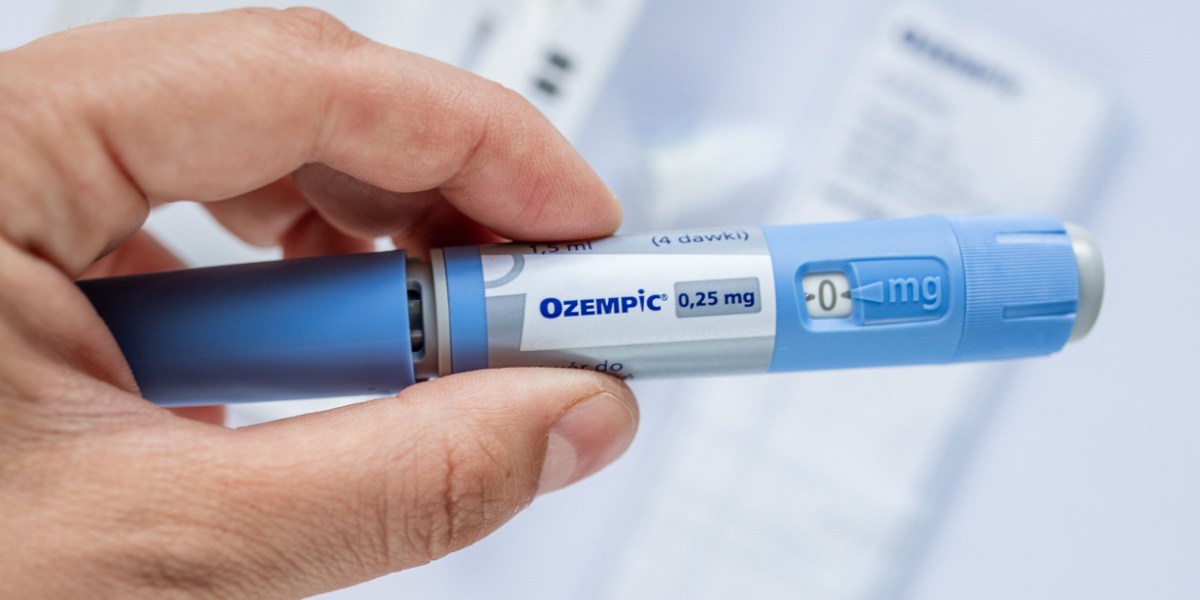Ozempic (semaglutide) is a popular medication with a novel mechanism of action that impacts the reward and hunger centers in the brain and blood sugar levels, making it a popular treatment for type 2 diabetes mellitus, obesity, and potentially addiction. This guide will explore the uses of Ozempic, how it works, dosage guidelines, potential side effects, and risks and answer common questions among Ozempic users.
- Ozempic is FDA-approved for managing blood sugar levels in adults with type 2 diabetes in combination with a healthy diet and exercise.
- Ozempic has gained increasing popularity due to its effectiveness in managing type 2 diabetes, its ability to reduce cardiovascular risks, and its powerful weight loss properties.
- Only some people who take Ozempic will experience side effects, and the severity of side effects may differ from person to person.
- If you want Ozempic, schedule an appointment with your healthcare provider, who can evaluate if this medication is appropriate for you.

What is Ozempic?
Ozempic is a prescription injectable medication that contains the active ingredient semaglutide. It belongs to a class of drugs known as glucagon-like peptide-1 (GLP-1) receptor agonists, which mimic the natural effects of the hormone GLP-1 in the body.[1] This hormone plays a crucial role in regulating blood sugar levels, altering digestion, and increasing metabolism.[2]
Ozempic is FDA-approved for managing blood sugar levels in adults with type 2 diabetes in combination with a healthy diet and exercise.[3] It has also been shown to lower the risk of major cardiovascular events such as heart attack, stroke, or death.[4]
Ozempic can also promote weight loss, and its use has resulted in significant weight loss reductions in overweight individuals. These results led to the FDA's approval of a higher dosage of the active ingredient in Ozempic, semaglutide, sold under the brand name "Wegovy" for weight loss.[5]
Ozempic uses
Ozempic has multiple uses, including lowering the risk of certain cardiovascular events in individuals with type 2 diabetes, managing blood sugar levels, increasing weight loss, treating polycystic ovarian syndrome (PCOS), and may even play a role in treating addiction.
Of these uses, Ozempic has only been FDA-approved for managing blood sugar levels in adults with type 2 diabetes in combination with diet and exercise.[3] Research has also demonstrated Ozempic's ability to lower the risk of major adverse cardiovascular events in adults with type 2 diabetes who have been diagnosed with cardiovascular disease.[4]
Ozempic is often prescribed off-label for the treatment of obesity in overweight individuals. Research has demonstrated substantial weight loss, with total body weight loss percentages of approximately 6% at three months and 11% at six months of treatment.[6]
Although not FDA-approved for the treatment of individuals with PCOS, Ozempic has demonstrated promising results in treating insulin resistance in these individuals.[7] Treatment with Ozempic may lead to reductions in common symptoms associated with PCOS, such as obesity, increased hair growth, menstrual irregularities, and reduced ovarian function.
Interestingly, Ozempic has also been proposed as a potential treatment for addiction due to its ability to regulate reward pathways in the brain, which are activated by substance use. Although no clinical trials have investigated this specific use for Ozempic, patients prescribed Ozempic for weight loss also reported the medication reduced their desire to drink alcohol or consume other drugs.[8] Animal studies have also demonstrated promising results in this area, demonstrating semaglutides' ability to reduce alcohol intake and modulate GABA neurotransmission.[9][10] This vital neurotransmitter modulates impulse control and reward centers in the brain, which are central to the mechanisms behind addiction.
How does Ozempic work?
Several mechanisms at play make Ozempic effective at lowering blood sugar levels and reducing cardiovascular risks in individuals with type 2 diabetes. This includes:
- Increasing insulin production: Ozempic increases the amount of insulin the pancreas produces by stimulating the hormone incretin after glucose consumption. Insulin is a hormone responsible for lowering blood sugar levels after a meal.[11]
- Slowing gastric emptying: Ozempic slows the emptying of stomach contents into the small intestine. Slower digestion prevents rapid increases in blood sugar levels.
- Decreased blood sugar release: Ozempic reduces the amount of sugar released by the liver, which helps prevent blood sugar spikes.[12]
Overall, these effects can cause stabilization in blood sugar levels and better glycemic control in patients with type 2 diabetes.
Ozempic works slightly differently to promote weight loss. The mechanisms at play to promote weight loss include:
- Slowing digestion: Ozempic's ability to slow digestion and prevent gastric emptying causes individuals to feel full longer, promoting weight loss.
- Increasing signals of fullness: Ozempic increases signals to the hunger center in the brain that the stomach is full.[2] This promotes weight loss by reducing appetite and cravings.
- Increasing metabolism: Ozempic has been shown to increase energy expenditure in some studies, which may result in weight reductions.[2]
In combination, these effects can result in significant weight loss in overweight and obese individuals.
Ozempic doses
The recommended Ozempic dosage will vary based on various factors, such as the intended use, an individual's response to the medication, and blood sugar levels. Higher dosages are often used for weight loss, while a lower dose may be sufficient for blood sugar management.
Due to the potential for side effects, Ozempic dosage is slowly increased. Tapering the dose helps patients tolerate the changes in digestion that Ozempic may cause better.[13]
For blood sugar control, the recommended starting dosage is 0.25 mg injected weekly for four weeks.[13] If the medication is well-tolerated, your doctor will increase the dosage to 0.5 mg once weekly.[13] At this point, your doctor will check your blood sugar levels and determine if additional dose increases are necessary to obtain appropriate blood sugar control.[13]
If so, the dosage can be increased to 1 mg once weekly.[13] The maximum recommended dosage is 2 mg once weekly.[13]
Ozempic dosing for weight loss and PCOS treatment may differ.
Your doctor will work with you to determine the appropriate starting dosage for your needs.
Method of administration
Ozempic is a self-administered injection that is injected subcutaneously.[13] Subcutaneous injections are injected into the fatty tissue under the skin. It can be injected into the abdomen, thigh, or upper arm. Individuals must understand they should never inject Ozempic into a muscle or vein as this can cause unintended side effects.
Ozempic should be administered once weekly, on the same day each week, at any time of day.[13] This medication does not need to be taken with food.
The medication comes in a prefilled injectable pen with more than one dose. After each use, the needle of the injectable pen must be changed before another injection is administered.[13]
New, unused Ozempic pens should be stored in the refrigerator.[13] After use, the injectable pen should be stored with the needle removed and cap on at room temperature or in the refrigerator for up to 56 days.[13]
Your physician will provide you with detailed instructions when you begin Ozempic. If you have any questions about administration, reach out to your healthcare provider or pharmacist for clarification.
Why is Ozempic so popular?
Ozempic has gained increasing popularity due to its effectiveness in managing type 2 diabetes, its ability to reduce cardiovascular risks, and its powerful weight loss properties.
Clinical trials have demonstrated that Ozempic can help patients effectively reach glycemic targets over 30 weeks.[14] It has also been shown to be superior to other popular blood sugar medications, such as liraglutide, at reducing HbA1c, a measure of blood sugar levels and body weight in patients with type 2 diabetes.[14]
Additionally, Ozempic's once-weekly dosing makes it convenient for patients and has gained popularity among physicians for its ease of use.[13]
Known side effects of Ozempic
As with any medication, side effects are possible when taking Ozempic. You must be aware of the potential side effects when taking Ozempic and consult with your healthcare provider if you experience any new symptoms.[13] Only some people who take Ozempic will experience side effects, and the severity of side effects may differ from person to person.
Read our latest article where we ask the experts, Do Weight Loss Drugs Like Ozempic Hold The Answer to Long-Term Weight Management?
Short-term side effects
As an individual starts taking Ozempic, the alterations in digestion can cause mild side effects that are usually temporary. The common short-term side effects when beginning Ozempic include:[13]
- Nausea
- Constipation
- Diarrhea
- Abdominal pain
- Vomiting
These side effects typically will reduce as your body adjusts to the medication. If they persist or worsen as your dose increases, it is essential to consult your healthcare provider for further guidance.
Long-term side effects
Clinical trials have demonstrated some potential long-term side effects of Ozempic. These side effects are rarer than short-term, but awareness of their potential is essential as they can be more severe if left untreated.
Long-term side effects include:[13]
- Pancreatitis
- Increased risk of diabetic retinopathy complications
- Gallbladder disease
- Thyroid C-cell tumors
- Hypoglycemia
- Acute kidney injury
- Anaphylaxis or allergic reaction
Ozempic face
A potential side effect associated with the loss of facial fat is "Ozempic face." This side effect has gained recent attention on social media platforms due to the somewhat odd appearance it may cause.
Due to Ozempic's potential to cause rapid weight loss, facial fat loss can cause a hollowing or thinning of the face, referred to as the "Ozempic face." The skin may sag where there is significant fat loss, causing a gaunter appearance. Some individuals may interpret this alteration of fat in their face as a change of shape to their face, which may be quite alarming.
This side effect is rare and can be reversed when a person's weight stabilizes, and the skin has some time to retract. Additionally, the facial fat will replenish if Ozempic is stopped and weight is regained.
Do you need a prescription to take Ozempic?
Yes. Ozempic is a prescription medication that must be prescribed by a healthcare provider who can assess if Ozempic is appropriate for you. This medication is not available over the counter.
It is essential to only get Ozempic from a healthcare professional who has evaluated your medical history and current health status, as purchasing this medication elsewhere can lead to unwanted side effects and product purity and safety issues.
How to get Ozempic
If you want Ozempic, schedule an appointment with your healthcare provider, who can evaluate if this medication is appropriate for you. During your appointment, your doctor will discuss the pros and cons of starting Ozempic and determine if treatment is appropriate.
If your healthcare provider decides Ozempic is a good fit for your current healthcare needs, they will prescribe it. Ozempic can be obtained from your local pharmacy, an online pharmacy, or a mail-order pharmacy, depending on your healthcare provider's recommendations and personal preferences.




-guide-detail.jpg?v=1722502528)